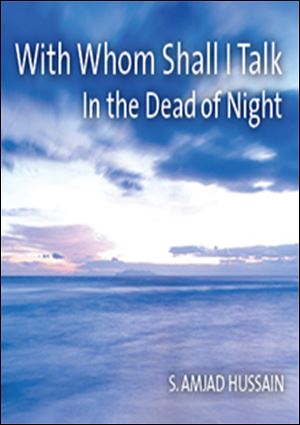
BOOKS
Loss of wife prompts letters of healing
12/18/2012Will the intensity of loss ever diminish? When will the open wounds ever heal? Is it always going to be so raw and fresh? Every day I think of you a thousand times …
Many Toledoans know Amjad Hussain in one or more of a variety of ways: As a distinguished, now-retired, thoracic and cardiovascular surgeon; as a University of Toledo trustee, the author of a popular column in The Blade and a number of well-written books, including The Taliban and Beyond, which grew out of an insightful series published in the newspaper just before Sept. 11.
Yet this is a very different book — and one which may well speak to a wider audience than his earlier works. It is the story of a great love, a long and happy marriage, and of finding a way to cope after a partner’s death. Amjad Hussain and his wife Dorothy “Dottie” were married for 38 years before she died in December, 2006 after a long battle with cancer. Theirs was not, to put it mildly, love at first sight, when they met at the former Maumee Valley Hospital.

'With Whom Shall I Talk in the Dead of Night' by S. Amjad Hussain (University of Toledo Press; 232 pages, $25)
Amjad was, he openly admits, a brash young firstyear surgical resident from Pakistan, who believed doctors gave orders and nurses were supposed to meekly follow them. Dorothy Brown may have been a beautiful woman, but she was a nononsense nurse from a small town in Michigan who had sensible ideas of her own, and was as stubborn as him.
After a titanic argument that started in the hospital morgue, they went out to continue their conversation and ended up falling in love.
They married, raised three children, and never looked back. Dottie loved Amjad enough to move to Pakistan with him and fall for a country that was, for her, as exotic as the dark side of the moon.
He remained Muslim and she Christian. They were each other’s anchors and soul mates until cancer intervened.
Friends and family were kind, but, as Dr. Hussain said, “after the flowers were swept away and the last sympathy card read — I found I was still lonely.” He thought he had prepared himself for her loss, but learned that he was totally wrong.
So he began writing his beloved a series of letters, a series that continued over two years. They are playful, sad, moving, and amusing. Amjad candidly tells Dottie that at times he is angry with her for leaving him, as irrational as that may be. At other times his pain almost brings tears to one’s eyes. He still feels the hollow her body made on their mattress; every night “when turning off the bedside light, I do say good night to you. I miss putting my hand on your arm and drifting off to sleep,” he says.
There is no literary shortage of laments by husbands for beloved wives they have lost, from popular Christian apologist C.S. Lewis’s A Grief Observed to the humorist Calvin Trillin’s touching tribute to his wife, About Alice.
But With Whom Shall I Talk in the Dead of Night strikes a human tone that is at once more familiar and more profoundly human than most such books. The portrait of Dottie Hussain that emerges is perhaps more vivid and well-rounded than it would have been if her husband had attempted to write a biography of her.
They were also his way of healing. “For two years I wrote these letters,” he concludes. “Through them I relived a good and happy life. I poured out my heart in ways I could not have done in any other way.” Then it was time to stop.
Eventually, he decided to share them with the world. Originally, I thought this might be a useful book for anyone who was undergoing similar grief.
But having read these letters, I think it might be just as useful for any adult who has yet to know the searing pain Amjad Hussain felt. For eventually, his journey is one which nearly everybody who loves somebody is bound to take.
Jack Lessenberry is a member of the journalism faculty at Wayne State University in Detroit and The Blade's ombudsman.
Contact him at: omblade@aol.com